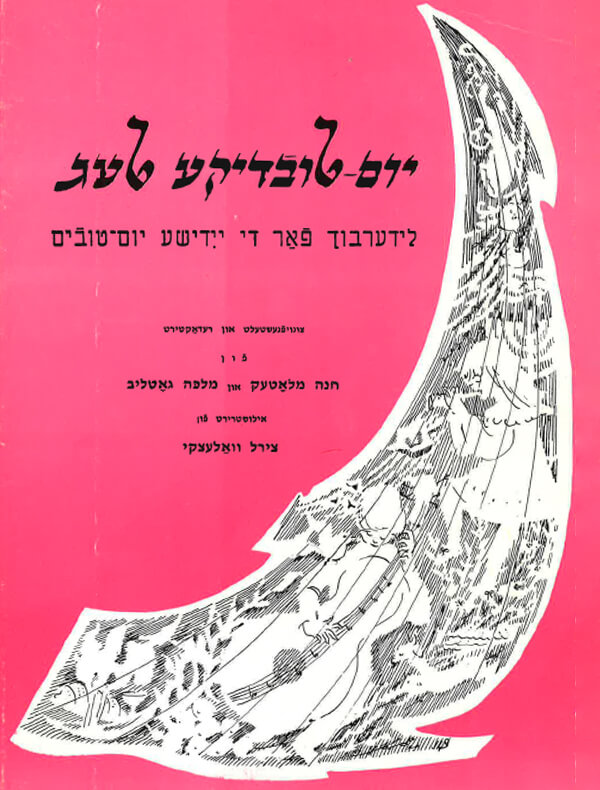
If we had only been
fortunately delivered from Egypt,
but the sea had not been split —
It would have been enough.
If the sea had been split
but to pass through on dry ground
was not then our lot —
It would have been enough.
If we had made it through
but had not been able to endure
forty years in the great desert —
It would have been enough.
If we had made it through
forty years in the desert
but did not find manna there —
It would have been enough.
If we had found manna there
but had not received the Sabbath,
and did not come to Mount Sinai —
It would have been enough.
If we came to Sinai
but did not receive the Torah,
did not become the People of the Torah —
It would have been enough.
Voltn mir nor fun Mitsrayim
Gliklekh oysgeleyzt gevorn,
Nor der yam zikh nit geshpoltn —
Dayeynu.
Volt der yam zikh shoyn geshpoltn
Nor im durkhgeyn in der trukn,
Volt undz demolt nit gegoltn —
Dayeynu.
Voltn mir im shoyn ariber.
Nit gekent nor iberkumen,
Fertsik yor in groysn midber —
Dayeynu.
Voltn mir di fertsik yor shoyn
Im dem midber durkhgekumen
Un keyn man dort nit gefunen —
Dayeynu.
Voltn mir dort man gefunen,
Nor dem shabes nisht bakumen,
Un tsum Sinay nit gekumen —
Dayeynu.
Voltn mir tsum Sinay kumen,
Nor di toyre nit bakumen,
S’folk fun toyre nit gevorn —
Dayenu.
װאָלטן מיר נאָר פֿון מצרים
גליקלעך אױסגעלײזט געװאָרן,
נאָר דער ים זיך ניט געשפּאָלטן —
דײנו.
װאָלט דער ים זיך שױן געשפּאָלטן,
נאָר אים דורכגײן אין דער טרוקן,
װאָלט אונדז דעמאָלט ניט געגאָלטן —
דײנו.
װאָלטן מיר אים שױן אַריבער,
ניט געקענט נאָר איבערקומען
פֿערציק יאָר אין גרױסן מידבר —
דײנו.
װאָלטן מיר די פֿערציק יאָר שױן
אין דעם מידבר דורכגעקומען
און קײן מן דאָרט ניט געפֿונען —
דײנו.
װאָלטן מיר דאָרט מן געפֿונען,
נאָר דעם שבת ניט באַקומען,
און צום סיני ניט געקומען —
דײנו.
װאָלטן מיר צום סיני קומען,
נאָר די תּורה ניט באַקומען,
ס׳פֿאָלק פֿון תּורה ניט געװאָרן—
דײנו.
Song Title: Dayeynu

Written by Chana Mlotek and her sister Malke Gottleib, Yontefdike Teg, a holiday songbook, was originally dedicated to Aaron Fishman, a beloved Yiddish educator, whose devotion to Yiddish culture inspired countless students who went on to become leaders in education and the arts. Because of Aaron Fishman’s long-term loyalty to the Yiddish shules (schools), the Yontefdike Teg collection was designed to serve the Yiddish shule and also to be an integral part of the Jewish home. The songs were chosen from material that was used in various types of Yiddish shules. Some of the songs even stem from the very beginning of the modern Yiddish shule in Europe and in America. In the collection, remarkable material can also be found, such as: songs sung in the Yiddish shules in Argentina; revived folksongs; adaptations from Avrom Goldfaden melodies; and new original music. The forty songs were chosen on the basis of first-hand experience of teaching Yiddish songs to children in the Yiddish shules and intentionally selected to be easily memorized and give great joy in singing.
The selection of the songs in this collection reflects the teaching practice in the modern Yiddish shule. There are more songs for the holidays of Chanukah, Purim and Pesach than for other holidays, largely because people are more likely to devote themselves to these holidays than to the others. Some songs represented a special significance for the editors. For example, the charming Khatsi-halayla (In the middle of the night) was chosen by the Arbeter Ring shules in Philadelphia, with which Aaron Fishman had close ties for many years. A second song, Shavuos, for which Aaron Bromberg (עייה), another teacher, had written the lyrics, has become a Chassidic tune that was taught by Leibush Lehrer, someone who had a very great universal influence. A notable innovation in this collection is that the songs are published in Yiddish, together with an English transliteration and an English summary for each song. Both the Yiddish and English transliterations conform to YIVO usage, the highest academic Yiddish language authority. The music is set in keys that are not difficult for young voices and that young fingers can easily play on the piano.
Those who have undertaken responsibility in the preparation of this collection are all active practitioners of Yiddish training, music and art. In addition, they all possess another underlying commonality: all were born in the United States, graduates of the Yiddish shules where, in several instances, they learned to sing the songs for the first time. They have all continued their interest and enthusiasm for the Yiddish shule. Not only have Yiddish songs enriched their private lives, but through these Yiddish songs, friends and family have developed love and respect for Yiddish music and Yiddish cultural works. In the original introduction, Mlotek and Gottleib write: It is our hope and aim that for Jewish children and their parents, the Jewish holidays in the shule and in the home will always be accompanied by Yiddish song and that Yiddish song will always help fortify the Jewish home and the Jewish holidays.